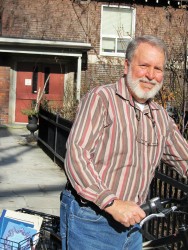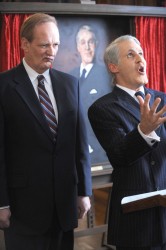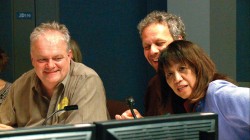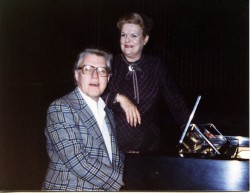 Last December, Stuart Hamilton sent an email to Marshall Pynkoski, co-director of Opera Atelier. Hamilton wrote: Dear Marshall, last night I dreamt that you told me that next season you were planning Le Nozze di Figaro and that you wanted me for the role of Cherubino. When I mentioned that next season I will be 82, you said that, in line with the current “colour-blind” trend in casting, you were planning an “age-blind” production and that you felt I had the right bratty personality for the page. Although immensely flattered, I turned you down – to your obvious chagrin, not because of my age, but because I feel that I can no longer do justice to the Gs in the repeated phrase “portando via con se.” I feel that it’s only fair to warn you that if indeed you’re planning such a production my answer would be the same. I was at least relieved that you hadn’t offered me the Countess. I could never manage the long phrases in “Dove Sono.” With continued admiration and respect, from your ancient pal, Stuart.
Last December, Stuart Hamilton sent an email to Marshall Pynkoski, co-director of Opera Atelier. Hamilton wrote: Dear Marshall, last night I dreamt that you told me that next season you were planning Le Nozze di Figaro and that you wanted me for the role of Cherubino. When I mentioned that next season I will be 82, you said that, in line with the current “colour-blind” trend in casting, you were planning an “age-blind” production and that you felt I had the right bratty personality for the page. Although immensely flattered, I turned you down – to your obvious chagrin, not because of my age, but because I feel that I can no longer do justice to the Gs in the repeated phrase “portando via con se.” I feel that it’s only fair to warn you that if indeed you’re planning such a production my answer would be the same. I was at least relieved that you hadn’t offered me the Countess. I could never manage the long phrases in “Dove Sono.” With continued admiration and respect, from your ancient pal, Stuart.
Pynkoski was amused, and moved, enough to post the email on his blog (www.operaatelier.com/blog), describing Hamilton as “Canada’s vocal coach extraordinaire and man about town.”
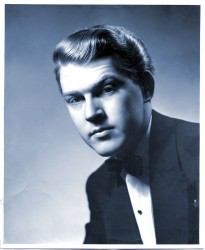 Hamilton’s mellifluous voice may not be a presence on opera stages these days – not that it ever was. But it certainly is well-known to Canadian opera-lovers, mostly from his many years as quizmaster on CBC Radio’s Saturday Afternoon at the Opera. Hamilton has an unmatched knowledge of all things operatic, honed by his long experience coaching, giving master classes, and accompanying Canada’s top singers like Lois Marshall, Elizabeth Benson Guy, Maureen Forrester, Jon Vickers, Richard Margison, Ben Heppner, Russell Braun and Isabel Bayrakdarian.
Hamilton’s mellifluous voice may not be a presence on opera stages these days – not that it ever was. But it certainly is well-known to Canadian opera-lovers, mostly from his many years as quizmaster on CBC Radio’s Saturday Afternoon at the Opera. Hamilton has an unmatched knowledge of all things operatic, honed by his long experience coaching, giving master classes, and accompanying Canada’s top singers like Lois Marshall, Elizabeth Benson Guy, Maureen Forrester, Jon Vickers, Richard Margison, Ben Heppner, Russell Braun and Isabel Bayrakdarian.
As well, he spent twenty years running Opera in Concert, which he started in 1974, and was the first music director of the Canadian Opera Company Ensemble. He even played Dudley Moore’s part in a tour of Beyond the Fringe.
I met with Hamilton last month at his apartment, where he was recovering from a recent heart attack and surgery. He looked remarkably vigorous and dapper. He lives in the same building that housed the legendary Eaton auditorium – now authentically restored, he points out – where he had worked as an usher when he first came to Toronto in 1948.
Your early years were in Saskatchewan? I was born and raised in Regina – and I still bear the emotional scars.
You must have stood out there as a rather unusual kid. Unusual is a nice way to put it. It was the depression – there was the drought and the grasshoppers. It was just hideous. So I lived at the movies. All I wanted to do was get out of Regina and be up on screen doing routines with Shirley Temple, Jeanette Macdonald, Nelson Eddy and all those actors.
I was surprised to learn that you didn’t start piano lessons until you were fourteen. It’s true – I started out as a child actor. I was very tiresome, but I was good because I was funny. So I was always cast as the comedy person. But I wanted to be the boy that was saving the girl from the giant or whatever. The woman who ran the children’s theatre was very tough, and I liked her a lot. So one time I told her I didn’t want to be the comedy person any more, I wanted to play the boy. She said, “Listen, kid, the way you act you’re lucky you’re not being cast as the girl.”
So I gave that up and started to sing. I had quite a remarkable boy soprano voice, and I won all the festivals. I used to sing at luncheons for the men’s clubs at the Saskatchewan Hotel.
I would sing Philene’s aria Je suis Titania from Mignon by Thomas. But I didn’t know anything about French, so I just copied the sounds from
a record of the French soprano
Lily Pons.
How did you get interested in opera? It was through the broadcasts from the Metropolitan Opera, like millions of people. I still remember the first time I heard the Met Opera. I had been fiddling around with the dial on the radio and I came across these three people singing their heads off. It was the finale from Gounod’s Faust – the big trio Anges purs, anges radieux. I was so astonished I was crying. My father came in and said, “What’s the matter with you now?” My father, who was a lawyer, was a very good man. But he and I didn’t understand one another at all, so we never got along well. In fact, when I was given an honorary Doctor of Laws from Dalhousie a couple of years ago, I was sure he was in heaven saying, “Doctor of Laws my ass – you barely got through high school!” I couldn’t explain to him that I had just discovered what my life was going to be about. He never understood what music meant to me.
Then the next week they did Wagner’s Tannhäuser. I didn’t know who Wagner was, but the minute the overture started my hair stood on end. I was hooked – all because of the Met broadcasts.
Did you ever want to be a concert pianist? No, I took up the piano because my sister Dorothy wanted to be a Broadway singer. There was no opportunity in those years, so she sang classical music. She had a beautiful voice, so I decided to study the piano so that I could play for her. I was always more interested in accompanying than a solo career.
Yet you did give solo recitals in places like New York, London and Paris – and apparently they were quite successful. But that was only to establish myself as a pianist. I went too quickly when I started and I didn’t develop a good technique. Alberto Guerrero, my teacher, said I had the worst hands for the piano he had ever tried to deal with. But that didn’t stop me.
Did he understand that you didn’t intend a career as a solo pianist? Yes, Guerrero understood. I first met him when he was in Regina adjudicating for the RCM. He asked me what I wanted to do with my piano. I said I wanted to be an accompanist. He said, “Ah, but to be an accompanist you have to be a very good pianist.” So as a result of those recitals I was hired by singers like Lois Marshall and Maureen Forrester to accompany them and tour with them. Both those ladies were just unbelievably great singers.
I still remember that extraordinary concert they gave together at Massey Hall sometime in the early 1970s, with you on piano. When you got them on the stage together, they sent sparks off each other. It was so exciting, and they were fabulous. But they didn’t like one another very much. Maureen resented the fact that everybody talked about how spiritual Lois was, that she had a direct line to Bach and every composer she sang. She was an incredibly intuitive singer. And Lois resented Maureen’s success.
Wasn’t Guerrero Glenn Gould’s teacher as well? Yes, and Glenn and I were friends then. When I was preparing for my first recital in New York, Glenn told me he wanted to hear my recital because he hadn’t heard me play for quite a while. So I started playing for him – and then, of course, he took over.
You mean he took over at the piano? He took over the whole afternoon. Glenn was never one to sit there and listen to other people play. After I played a couple of pieces, he just said, “No, no – that’s no good. You can’t play those pieces, you don’t have the technique.” He was right. So he changed my repertoire, and I chose an entirely different program. Later he said, “You’ve improved, but you still play like an accompanist.” Which I did. I was never a good solo piano player.
Why did you first come to Toronto? I came for the summer master class in accompanying with Gerald Moore in 1948. I had won the top award at a festival in Regina, which was $200 – a fortune in those days. That’s where I first met Lois Marshall and Elizabeth Benson Guy, with whom I had a long and wonderful relationship as coach and accompanist.
I had first heard Elizabeth on the radio when she won a CBC contest on a program called Singing Stars of Tomorrow. I had written her a letter from Regina telling her how much I had enjoyed her performance – she had studied with the same teacher as my sister. Then when I met her at Gerald Moore’s class she told me she was going to be singing Turandot (which she never should have sung because it was not for her voice). I told her I loved Turandot, and so we started working together. The CBC had started the CBC Opera Company to produce operas for the radio. Elizabeth sang some twenty leading roles in the nine years they produced operas. So I coached her in all that repertoire, three or four times a week for at least fifteen years, and I toured with her. She was a marvellous singer. She was the daughter-in-law of Greta Kraus, and they lived in the same house. So I got to play for Greta’s classes as well, which was a wonderful experience,
What was Kraus like to work with – she had so much influence here, and not just on singers. Greta was a great lieder teacher. She was just so passionate about the music that it was thrilling to work with her. I learned a tremendous amount from her.
But I understand that she was quite a character. The conductor Heinz Unger, who, like Greta, had come from Germany to escape the Nazis, liked me because I played Mahler very nicely. At one low point in my career I said to Greta, “It’s terrible – Heinz Unger is the only person in the musical establishment here in Toronto who likes me.” She said, “Yes, he’s deaf, you know.” That was Greta – though it was true that Unger wore a hearing aid.
I played in New York for Vera Shwartz, a very beautiful and elegant singer who had given the early performances of Richard Strauss’ Die Ägyptische Helena and things like that. Once, after I finished playing Strauss’ Ständchen, which is very tricky, Vera said, “Stuart, Strauss played that for me many, many times and never played it as well as you do.”
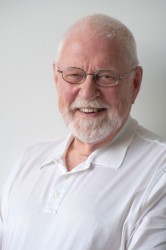 I came back to Toronto all puffed up and told Greta what Vera had said. Greta said, “I should hope so. Strauss was a terrible pianist.”
I came back to Toronto all puffed up and told Greta what Vera had said. Greta said, “I should hope so. Strauss was a terrible pianist.”
What about Jon Vickers? There’s no question he was one of the great singers. He had a wonderful voice, but it was his intensity that was really amazing. Yet he was a very, very insecure person.
I’ve heard of singers being scared of him on stage, because he would get so wrapped up in the character he was playing. Vickers was a very scary performer. Teresa Stratas told me that she was absolutely terrified when they did Pagliacci, because he would throw things. At one time he was doing the final scene from Verdi’s Otello for a television show from the National Arts Centre. Desdemona was one of my coaching pupils, Stephanie Bogle, who was very experienced and knew the music beautifully. But she was just terrified. He said to her, “You must do exactly what I say. If you don’t, you’re liable to be injured.” In the opera, of course, Otello strangles Desdemona. But it seemed as though Jon was really going to kill her. Of course he didn’t, because she did exactly what he said. I saw performances where he terrified the audience as well.
Why does Canada produce so many outstanding singers? When I used to go down to New York to do the Metropolitan Opera broadcast quiz – I did that for seventeen years – they kept asking me how we produce all these wonderful singers up here in Canada. I think it has something to do with our immigration policy. We have so many people from different ethnic backgrounds.
With all the work you have done in producing operas, accompanying recitals and coaching opera singers, you are still best known here as quizmaster on the CBC opera quiz. How did the Canadian version get started? When the Canadian Opera Company arranged with the CBC to broadcast their productions in 1982, the sponsor, Texaco, wanted to have a quiz like they had on the Met broadcasts. The very first broadcast was live from what was then called the O’Keefe Centre. When we got to the end of the scripted questions I started to wind things down when I got a message from the producer, Robert Cooper, who was a good friend and also the conductor of the chorus for Opera in Concert. He said, “Stretch it out for 2 ½ more minutes.” Well, my hair just about fell out – how was I going to do that? Fortunately Lotfi Mansouri, who was then the head of the COC, was on the panel. So I asked him, “Lotfi, if you had all the money in the world what operetta would you produce?” At that time he had already done most of the opera repertoire, so I thought it would be more interesting to ask about operetta than opera. So Lotfi, who was a great talker, went on for 2 ½ minutes.
Do you think the CBC quiz was an important part of our culture? Yes I do, because even though it was amusing and entertaining, there was always a lot of intellectual depth. We had very good people on the panel – they all knew what they were talking about and were very articulate. So I think it had an enormous impact. We got many letters saying, “I don’t always listen to the opera but I always listen to the quiz.” When I would go across the country doing master classes at various universities, people would always come up to me and tell me how they always learned so much and found it so much fun.
Were you surprised when the quiz was cancelled? I was shocked. I knew something was going on, but no-one had said anything to me. So in the fall of 2007 the program started, but nobody had contacted me about it. After a couple of weekends I got a call from the interim producer. He said, “Hi Stuart, how are you?” I said, “I’m fine, thanks. How are you?” He said, “You’re fired.” I said, “Well, I assumed as much because the program has been on – and I’m not on it.” So he apologized for not calling me sooner, and explained that he had been trying to save his own job – which didn’t happen, because he was fired anyways.
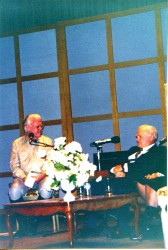 Right from the start the repertoire for Opera in Concert was remarkably adventurous – how did you choose it? It was partly my own taste, of course. But also I knew what singers were available and what roles would be good for them. That was the essential thing about Opera in Concert – it highlighted the singers in roles that I knew would show them to good advantage.
Right from the start the repertoire for Opera in Concert was remarkably adventurous – how did you choose it? It was partly my own taste, of course. But also I knew what singers were available and what roles would be good for them. That was the essential thing about Opera in Concert – it highlighted the singers in roles that I knew would show them to good advantage.
But didn’t it also give you an opportunity to highlight composers you particularly loved, like Massenet, who was quite overlooked at that time? I remember once being on the Metropolitan Opera broadcast in New York when they were talking about Massenet, and I said we had done thirteen Massenet operas. They were just astonished.
And Hamlet by Thomas – you did that when it hadn’t been done anywhere in North America for ages. Yet it had been one of the most popular operas in the 19th century. It was, and it still works really well. It was the very first opera we did, in 1974. Though it wasn’t just French opera we produced. We also did a lot of Italian, and some German in the twenty years I produced Opera in Concert. Since then Bill (Guillermo Silva-Marin) has done a wonderful job.
You said on air many times that Debussy’s Pelléas et Mélisande is your favourite opera. On the quiz I would get letters from a gentleman in Vancouver who absolutely hated my enthusiasm for Pelléas. He would write, “How can you put up with this tuneless garbage?” So we had a very amusing back and forth about that for a long time.
Yet the production we had here in Toronto certainly made it hard to love. When they first did that production at the old O’Keefe I just couldn’t believe my eyes when I saw that awful set and those ridiculous costumes. They’re not trusting the material when they do that.And it wasn’t any better when they did it in the new house.
Even though the singing was so good? And the opera orchestra we have here is really first-rate – they did really beautiful work. But that didn’t help. I bet nobody would want to go back to see that production again. Yet it is one of the most powerful operas.
It’s interesting because you put on operas without elaborate costumes or scenery, and they were successful. True – it’s the actual voice that really counts, not just the look.
Now tell me please, what do you have against Rossini? (He laughs.) I don’t hate Rossini. I think if I had known him I would have liked him a lot because he seems to have been a very enchanting personality. Everybody talks about Rossini’s melodic gift. And I’ve certainly given his music a chance – I’ve listened carefully. But it’s such mechanical music. The Barber of Seville is fun, there’s no question about that – it’s a great piece and it works wonderfully.
A couple of weeks ago I listened to his Armida from the Met. Renée Fleming was just astonishing, all five tenors were great, and the orchestra played wonderfully. But I found that, all the way through, those boys and Ms. Fleming did nothing but jiggle up and down. The coloratura was meaningless – just jiggling for the sake of jiggling. It was the same when the COC did Il viaggio a Reims. They had great singers who sang the coloratura like mad-women and men, but there wasn’t a moment in the whole performance that I cared for. about, that moved me.
So you don’t find Desdemona’s Willow Song in Rossini’s Otello moving? Eeeeh!
What about the Stabat Mater? It’s efficient music.
But you don’t say that about Donizetti or Bellini. Those guys had tunes.
Or Handel? It’s much different in Handel – Handel’s coloratura comes from the text. With Rossini it’s imposed, just to show off the voice. I’m not against coloratura at all, as long as it really means something. For instance, at the end of the first act in Verdi’s La traviata when Violetta sings Sempre libera, there it shows her psychological state.
What do you think about these outstanding opera directors Canada is now producing like Robert Lepage and Robert Carsen? One of the most beautiful opera productions I’ve ever seen was Carsen’s production of Tchaikovsky’s Eugene Onegin at the Met. It was simple, but very much based on the psychological impact of the story. I found it just overwhelming. In that last scene with one chair on the stage – I thought when it first started it wasn’t going to work, but it did – the music and the drama came across so strongly. So I’m a great fan of Carsen’s.
And he’s finally returning to the COC to direct Gluck’s Orfeo ed Euridice in May. Then he’s off to the Mariinsky to direct My Fair Lady. Do you think a major opera house should be doing a Broadway show like My Fair Lady?
It’s one of the great theatrical pieces of the twentieth century. As a matter of fact, my nephew Ben Carlson, who’s an actor, married Deborah Hay, who is singing Eliza at the Shaw Festival this year. Ben’s mother, the actor Patricia Hamilton, is my sister.
But does it belong in an opera house?
Sure, I think My Fair Lady is wonderful when anybody does it, if they do it carefully. The opera world is always fighting financial problems, so if you put on a show like that, it brings in the box office – and they need that. Plus it’s a great work of art.
Speaking of actors, I understand that you have written some plays. One morning in 2004 or 2005 I woke up with a play in my mind, so I sat down and wrote it out. It was done by the evening. Of course it was no good. But then two more plays came to me just like that, all within the space of about six weeks. They were more interesting. So they will be found among my papers after I kick off.
And a memoir as well? My autobiography – it’s called Opening Windows – is in the hands of publishers. Whether or not it gets published is another thing. I think it’s fun, and people I’ve shown it to have been very encouraging. Have you read Lotfi Mansouri’s autobiography? I found it very moving to read about what he had to go through in San Francisco. I think what he did there was very heroic. For those of us who love the art form, it seems such a shame that we have to go through such a terrible lot just to get opera on the stage.
Pamela Margles is a Toronto-based journalist who writes The WholeNote’s monthly “Book Shelf” column.
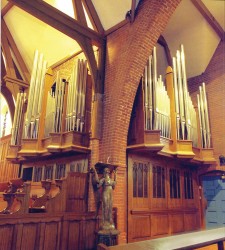 The current organ at St. Thomas’s is a Guilbaud-Thérien Inc. rebuild of the Church’s 1911/1955 3-manual, 45-stop Casavant (Opus 459) and the church’s original 1891 S.R. Warren 2-manual, 23 stop organ. Guilbaut-Thérien, Inc., Opus 37, 1991 has an electrified console and rebuilt organ with 60% new pipes (61 in all), and new windchests and casework …
The current organ at St. Thomas’s is a Guilbaud-Thérien Inc. rebuild of the Church’s 1911/1955 3-manual, 45-stop Casavant (Opus 459) and the church’s original 1891 S.R. Warren 2-manual, 23 stop organ. Guilbaut-Thérien, Inc., Opus 37, 1991 has an electrified console and rebuilt organ with 60% new pipes (61 in all), and new windchests and casework …

